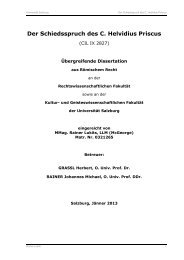(post) Keck Case Law on the Freedom to Provide Services
(post) Keck Case Law on the Freedom to Provide Services
(post) Keck Case Law on the Freedom to Provide Services
Create successful ePaper yourself
Turn your PDF publications into a flip-book with our unique Google optimized e-Paper software.
measure” <strong>on</strong>ly applies <strong>to</strong> a certain type of use restricti<strong>on</strong>, namely <strong>on</strong>e that equals a ban <strong>on</strong><strong>the</strong> sale of a product. 65 This line of argumentati<strong>on</strong> can also be found in earlier cases likeM<strong>on</strong>sees 66 , where <strong>the</strong> Court held that an Austrian rule which restricted <strong>the</strong> transport byroad of animals for slaughter in fact made internati<strong>on</strong>al transit almost impossible. 67The Court’s use of a more general language of “market hindrance” could be deliberate inthat an unspecified term allows for possible changes in <strong>the</strong> case law. The Court decided ina general way without restricting itself with regard <strong>to</strong> future decisi<strong>on</strong>s. To sum up,according <strong>to</strong> <strong>the</strong> argument presented here, <strong>the</strong> scope of Art 34 TFEU includes anydiscrimina<strong>to</strong>ry measure and any n<strong>on</strong>-discrimina<strong>to</strong>ry provisi<strong>on</strong> having <strong>the</strong> effect of banning<strong>the</strong> sale of a product or an equivalent effect (a high threshold in <strong>the</strong> sense of a quantitativeimport restricti<strong>on</strong>) because <strong>the</strong> lawfulness of a product has <strong>to</strong> be recognised by ano<strong>the</strong>rMember State according <strong>to</strong> <strong>the</strong> principle of mutual recogniti<strong>on</strong>. 68For <strong>the</strong> sake of completeness I want <strong>to</strong> shortly address ano<strong>the</strong>r line of argument, namely65Compare Opini<strong>on</strong> of A.G. Kokott in <str<strong>on</strong>g>Case</str<strong>on</strong>g> C-142/05, Mickelss<strong>on</strong> and Roos, [2009] ECR I-4273, paras.65-67. She argues that restricti<strong>on</strong>s <strong>on</strong> use should in principle be excluded from <strong>the</strong> scope of Art 34TFEU, unless <strong>the</strong> restricti<strong>on</strong> is such that <strong>on</strong>ly a marginal possibility of use remains for that product. It<strong>the</strong>n prevents market access in <strong>the</strong> sense of <strong>the</strong> term “preventi<strong>on</strong>” used in <strong>the</strong> <str<strong>on</strong>g>Keck</str<strong>on</strong>g>.66<str<strong>on</strong>g>Case</str<strong>on</strong>g> C-350/97, M<strong>on</strong>sees, [1999] ECR I-2921.67Ibid., para 29.68For a high threshold in respect of n<strong>on</strong>-discrimina<strong>to</strong>ry measures see Weiler in Craig/De Búrca, p. 372;Opini<strong>on</strong> of A.G. Kokott in <str<strong>on</strong>g>Case</str<strong>on</strong>g> C-142/05, Mickelss<strong>on</strong> and Roos, [2009] ECR I-4273, paras. 67-70,who states that <strong>the</strong> permitted use is marginal and does not affect <strong>the</strong> character of <strong>the</strong> Swedish regulati<strong>on</strong>as a fundamental prohibiti<strong>on</strong> <strong>on</strong> <strong>the</strong> use; Wennerås/Moen, “Selling Arrangements, Keeping <str<strong>on</strong>g>Keck</str<strong>on</strong>g>”,35(3) EL Rev. (2010), 387, at 394 ff; but see Prete, LIEI (2008), 152, who argues that a hindrance <strong>on</strong>lyhas <strong>to</strong> be possible and foreseeable; see also Straetmans, 39 CML Rev. (2002), 1419, who is against sucha limitati<strong>on</strong>; compare also <strong>the</strong> critic of Maduro in Andenas/Roth, pp. 64 f.22




